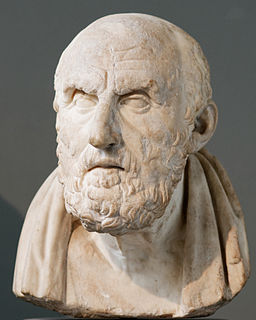Top 268 Plausible Quotes & Sayings - Page 5
Explore popular Plausible quotes.
Last updated on April 21, 2025.
I've never written a fiction before about real people. . . . I read everything that I could find by people who met them and tried to get some impression of them, but as always when you write fiction, even if you have completely fictitious characters, you start by thinking of what is plausible, what would they say, what would they be likely to do, what would they be likely to think. At some point, if it is every going to come to life, the characters seem to take over and start speaking themselves, and it happened with [COPENHAGEN].
Everyone has noticed how hard it is to turn our thoughts to God when everything is going well with us... While what we call 'our own life' remains agreeable, we will not surrender it to Him. What, then, can God do in our interests but make 'our own life' less agreeable to us, and take away the plausible sources of false happiness?
As agonizing a disease as cancer is, I do not think it can be said that our civilization is threatened by it. ... But a very plausible case can be made that our civilization is fundamentally threatened by the lack of adequate fertility control. Exponential increases of population will dominate any arithmetic increases, even those brought about by heroic technological initiatives, in the availability of food and resources, as Malthus long ago realized.
The denial of any distinction between foreseen and intended consequences, as far as responsibility is concerned, was not made by Sidgwick in developing any one 'method of ethics'; he made this important move on behalf of everybody and just on its own account; and I think it plausible to suggest that this move on the part of Sidgwick explains the difference between old-fashioned Utilitarianism and the consequentialism, as I name it, which marks him and every English academic moral philosopher since him.
After we have thought out everything carefully in advance and have sought and found without prejudice the most plausible plan, we must not be ready to abandon it at the slightest provocation. should this certainty be lacking, we must tell ourselves that nothing is accomplished in warfare without daring; that the nature of war certainly does not let us see at all times where we are going; that what is probable will always be probable though at the moment it may not seem so; and finally, that we cannot be readily ruined by a single error, if we have made reasonable preparations.
Sticks and stones may break my bones, but words can never hurt me." The adage is true as long as you don't really believe the words. But if your whole upbringing, and everything you have ever been told by parents, teachers and priests, has led you to believe, really believe, utterly and completely, that sinners burn in hell (or some other obnoxious article of doctrine such as that a woman is the property of her husband), it is entirely plausible that words could have a more long-lasting and damaging effect than deeds.
I hurt myself deeply, though at the time I had no idea how deeply. I should have learned many things from that experience, but when I look back on it, all I gained was one single, undeniable fact. That ultimately I am a person who can do evil. I never consciously tried to hurt anyone, yet good intentions notwithstanding, when necessity demanded, I could become completely self-centred, even cruel. I was the kind of person who could, using some plausible excuse, inflict on a person I cared for a wound that would never heal.
I think utopianism and eschatology are really two sides of the same coin. They both assume that some massively transformative event is going to happen that's going to completely change the nature of society. They only disagree on whether we get a happy ending or all die horribly. And so utopianism is on the wane right now because at the moment most of the plausible candidates for huge historical transformation look like they're going to kill us.
If someone who wanted to learn to dance were to say: For centuries, one generation after the other has learned the positions, and it is high time that I take advantage of this and promptly begin with the quadrille--people would presumably laugh a little at him, but in the world of spirit this is very plausible. What, then, is education? I believed it is the course the individual goes through in order to catch up with himself, and the person who will not go through this course is not much helped by being born in the most enlightened age.
The emergence of a unified cognitive moment relies on the coordination of scattered mosaics of functionally specialized brain regions. Here we review the mechanisms of large-scale integration that counterbalance the distributed anatomical and functional organization of brain activity to enable the emergence of coherent behaviour and cognition. Although the mechanisms involved in large-scale integration are still largely unknown, we argue that the most plausible candidate is the formation of dynamic links mediated by synchrony over multiple frequency bands.
When confronted with a demand that the universe have a cause, infidels have usually pointed out that God was not much of an explanation. This is true enough, but not really a positive argument. After mechanistic explanation became popular, infidels liked to restrict causality to the chain of causes in an eternal material universe, pointing out that no supernatural cause was then necessary. Plausible, but still rather defensive. Today's skeptic can do better. In all likelihood, the universe is uncaused. It is random. It just is.
Of course, there remains the question of why we should find mind-brain identities so persistently counter-intuitive, if they are true. But this is a simple psychological question, and there are a number of plausible explanations. Indeed this is a topic that is quite extensively discussed outside philosophy, by developmental psychologists and theorists of religion among others, under the heading of 'intuitive dualism'. It is rather shocking that so few of the many philosophers working on 'the explanatory gap' are familiar with this empirical literature.
All "if" statements about the past are as dubious as prophecies of the future are. It seems fairly plausible that if Alexander or Ghengis Khan had never been born, some other individual would have filled his place and executed the design of the Hellenic or Mongolic expansion; but the Alexanders of philosophy and religion, of science and art, seem less expendable; their impact seems less determined by economic challenges and social pressures; and they seem to have a much wider range of possibilities to influence the direction, shape and texture of civilizations.
I became so desperate that I considered throwing Eric [Beck] off the ledge. I thought I could get down and then lie about what had happened. To my addled brain, this was plausible. Then I came to my senses and woke Eric up and told him that either he had to retreat or I'd throw him off. We went down and I never climbed again for a quarter of a century.
..I sought a world philosophy-or an integral philosophy-that would believably weave together the many pluralistic contexts of science, morals, aesthetics, Eastern as well as Western philosophy, and the world's great wisdom traditions. Not on the level of details-that is finitely impossible; but on the level of orienting generalizations: a way to suggest that the world really is one, undivided, whole, and related to itself in every way: a holistic philosophy for a holistic Kosmos, a plausible Theory of Everything.
He must be able to hear them [the counter arguments] from persons who actually believe them; who defend them in earnest, and do their very utmost for them. He must know them in their most plausible and persuasive form; he must feel the whole force of the difficulty which the true view of the subject has to encounter and dispose of; else he will never really possess himself of the portion of truth which meets and removes that difficulty.
The Christian claim is: Nothing explains the facts better than an all-powerful, all-knowing, omnipresent god creating the universe and sending Jesus to spread his message. This is about as remarkable a claim as could be stated, and yet it is tossed out lightly. Christians seem to imagine that "God did it" is as plausible as the natural explanation that stories grow with the retelling. The Christian has the burden of proof, and it's an enormous burden given this enormous claim.
Remember William Blake who said: "Improvement makes straight, straight roads, but the crooked roads without improvement are roads of genius." The truth is, life itself, is always startling, strange, unexpected. But when the truth is told about it everybody knows at once that it is life itself and not made up. But in ordinary fiction, movies, etc, everything is smoothed out to seem plausible--villains made bad, heroes splendid, heroines glamorous, and so on, so that no one believes a word
As witnesses not of our intentions but of our conduct, we can be true or false, and the hypocrite's crime is that he bears false witness against himself. What makes it so plausible to assume that hypocrisy is the vice of vices is that integrity can indeed exist under the cover of all other vices except this one. Only crime and the criminal, it is true, confront us with the perplexity of radical evil; but only the hypocrite is really rotten to the core.
The trauma of 9/11 stimulated infinite possibilities for worry - some quite plausible, but most inspired by remote what-if fantasies. A society bingeing on fear makes itself vulnerable to far more profound forms of destruction than terror attacks. The "terrorism war", like a nostalgic echo of the cold war, is using these popular fears to advance a different agenda - the re-engineering of American life through permanent mobilization.
With a novel, you have the reader with you a lot longer, and you owe him a lot more. Obviously you have to have a plot - I say "obviously," although I think a lot of fiction doesn't, and nothing seems to happen. But to me, there should be something that happens, and it should be at least vaguely plausible. And because the readers are going to be with these characters for a long time, you have to get to know them and like them and want to know what happens to them.
That so many of us find it entirely plausible that a vast network of researchers and health officials and doctors worldwide would willfully harm children for money is evidence of what capitalism is really taking from us. Capitalism has already impoverished the working people who generate wealth for others. And capitalism has already impoverished us culturally, robbing unmarketable art of its value. But when we begin to see the pressures of capitalism as innate laws of human motivation, when we begin to believe that everyone is owned, then we are truly impoverished.
Sci-fi uses the images that sf - starting with H.G. Wells - made familiar: space travel, aliens, galactic wars and federations, time machines, et cetera, taking them literally, not caring if they are possible or even plausible. It has no interest in or relation to real science or technology. It's fantasy in space suits. Spectacle. Wizards with lasers. Kids with ray guns. I've written both, but I have to say I respect science fiction enough that I wince when people call it sci-fi.
Unlike any other business in the United States, sports must preserve an illusion of perfect innocence. The mounting of this illusion defines the purpose and accounts for the immense wealth of American sports. It is the ceremony of innocence that the fans pay to see - not the game or the match or the bout, but the ritual portrayal of a world in which time stops and all hope remains plausible, in which everybody present can recover the blameless expectations of a child, where the forces of light always triumph over the powers of darkness.
I don't like real places, but I don't like imagined ones either. I feel like I'm looking for some mixture and it's very hard for me to say because I like to use real place names because there's an uncanny feeling to them, but at the same time I don't ever really try to make them plausible. Sometimes I like to use them as a way to hide in plain sight a little bit, because to me a very exotic or imagined setting has a lot of weight and a lot of burden to it, and it doesn't suit me, but a real place seems to have its own weird legacy, so I don't know what the choice is?
Academic writing you have to get right. Fiction you have to get plausible. And there's a world of difference. In a way, if someone says this didn't feel exactly right, I don't care. But that is not okay to do in academia - it's not about feeling. You want to establish a pretty solid case. So did this allow me to express things differently? Absolutely. Another thing I've been thinking about as an academic: our writing style is expository, and in fiction, withholding information matters quite a bit. Withholding things in academia - there's no place for that!


























